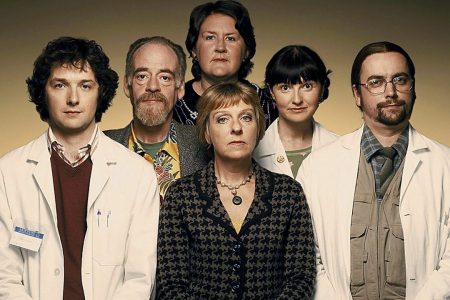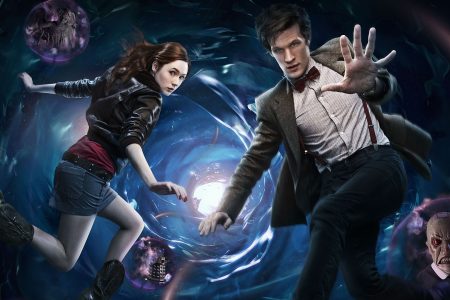As I did for my cinema habits of the first half of 2011, I’m jotting down a few notes on the various television programmes of interest that have passed my eyes. I’ve been watching a lot of dramas on the BBC (after they got a money infusion just before the stupid coalition government took it all away), but there’s a variety of other genres as well, just not in this post – see the next posts for others.
DRAMA
United
This starred David Tennant, in a one-off drama about the events leading up to the Munich air disaster in 1958 where 20 of the 44 people died aboard the plane carrying the Manchester United football team (nicknamed The Busby Babes). Tennant is coach Jimmy Murphy (he wasn’t on the plane because he was managing the Welsh international team on the same day – side note: he was the manager of Wales in the only time they qualified for the World Cup), who keeps the club going, even though they only had four surviving players able to play, including Bobby Charlton (the drama had focussed on his early days at Man Utd), because manager Matt Busby (Dougray Scott) was badly injured. This was the sort of excellent drama that the BBC does, and it was moving (obviously, based on the central event) and a fascinating glimpse of a different world.
Christopher And His Kind
Doctor Who connection again: this sees Matt Smith showing that there’s more to him than his excellent portrayal as the Doctor. He plays Christopher Isherwood, the author (this is an adaptation of Isherwood’s autobiography; Isherwood also wrote the novella Sally Bowles, which was the source of inspiration for Cabaret; he also wrote A Single Man, which was turned into an excellent film with Colin Firth by Tom Ford), and his time spent in Berlin in the early 1930s. He has a tumultuous affair with a young German man which ends abruptly, only to see him as a Nazi later on; he also teaches English to a wealthy Jewish department store owner, which leads to him seeing firsthand the effect of Nazis on Jews; he meets another young man and they eventually leave Germany but Isherwood can’t get his lover a passport, so they travel around Europe for a while. It is a powerful drama with excellent performances but particularly Matt Smith, who is fantastic in a role that is completely different from his famous alter ego.
Exile
The first Alzheimer thriller, starring John Simm and Jim Broadbent, with a great supporting turn from Olivia Colman. Simm is a disgraced journalist who has to leave London and return home up north, where his sister (Colman) looks after their father (Broadbent), a well-known newspaper man who now suffers from Alzheimer’s disease. Simm hasn’t been home for a while because of the time his father beat him when he discovered something in his father’s study, but this memory is what sets off events as Simm finds out more about the circumstances behind it and the conspiracy that his father seems involved in (the council leader was the man he was investigating, who had been a doctor with possibly dodgy credentials at a psychiatric hospital where there were rumours of one of the orderlies forcing inmates into sex with him and others). The programme was three one-hour episodes shown over three nights, and the best part was the chance to see Simm and Broadbent acting against each other (Colman was good too), but the conspiracy element wasn’t enough for the intensity the programme was trying to display, thus leaving the ending weakened.
The Shadow Line
This was a very intriguing series that really split viewers down the middle: either they thought it was interesting and different, or they thought it was annoying and slow. It was a unique programme: written and directed by Hugo Blick, known for his comedy work, and it had an individual rhythm to the storytelling and the dialogue, with lots of pauses and camera shots lingering on props. The story was about the cops and criminals investigating the murder of a drugs boss, but it was also about the people doing the investigating, particular the DI running the police investigation (Chiwetel Ejiofor) and the ‘consultant’ of the drugs gang (Christopher Eccleston). It had a great cast – the two leads were strong, and Rafe Spall was a scene-stealer as the nephew of the murdered drugs boss – and a sensibility that made it feel more like a novel on television. The series was good but it had one incident that took me out of the story – when Stephen Rea’s mysterious character survived being shot with hardly any after effects, my heart was no longer engaged in the otherwise excellent drama.
The Crimson Petal And The White
This got good reviews, but that hadn’t persuaded my girlfriend and me to watch it. When it was recommended by my girlfriend’s parents and her cousin, we thought we should check it out on iPlayer. An adaptation of a novel in four hour-long episodes, it was an interesting approach to a period drama (it was set in the late 1800s), with unusual mood music and shifting camera work and focus instead of the more stately style that is employed in these sorts of things. It was sufficiently interesting to keep watching, but we never really connected with it. It was good to see Chris O’Dowd acting well in a straight piece, and there were nice supporting turns from the likes of Gillian Anderson, Sheila Henderson, Mark Gatiss and Richard E Grant, but we didn’t really care about what was going on to get absorbed into the drama.




